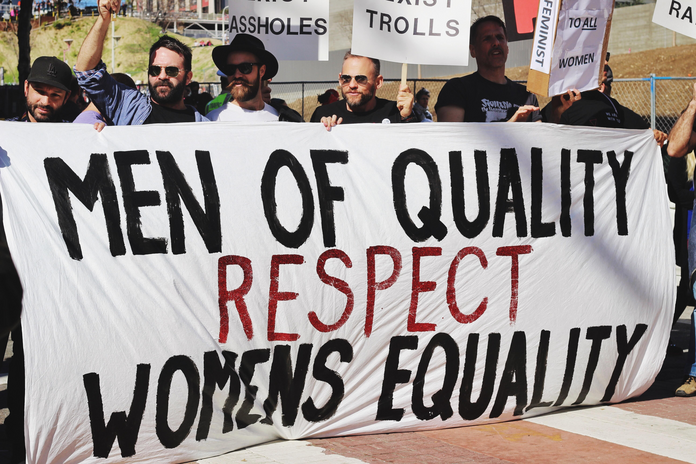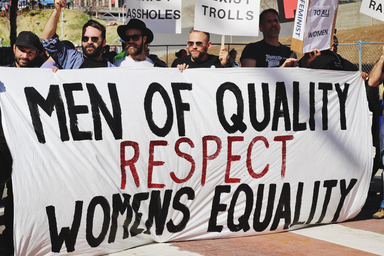No, I’m not a pick me. This new wave of feminism on TikTok, a platform where satire runs wild, that users are advertising, is bringing us further away from our goal of true gender equality and respect on both sides of the line that has been drawn in the sand for millenia.
What does TikTok feminism mean, where it comes from, and why it’s toxic
I mean, I get it, and I’m mad too. Being part of the female gender, that has been oppressed and subjected to systemic inequality basically since mankind existed, gets real tiring, real fast, for something we have absolutely no control over.
This disparity between men and women manifests everywhere, gender pay gaps, the responsibility to care for children in their families, the lack of women on boards of directors, and the sheer generalisation of women as the ‘weaker’ kind that needs ‘protection’ that continues to drag on today. We need to hold those groups of people (men especially) that wield a disproportionate amount of power against women accountable. For these are groups that are either reinforcing and replicating the patriarchal structures of violence and control over women or aren’t actively fighting against the status quo too, even if it’s in a small way.
Today though, on platforms like TikTok where it’s normalised to have all verbal filters switched off, people are allowed to voice their uncensored and many times biased and exaggerated opinions. Because of how TikTok works, it’s easier than ever to see content and spread untrue/ propagandistic messages. What was once satire, popularized by influential users like Chrissy Chlapecka has taken a serious turn. TikToks on “women be like…” or “men be like…” isn’t going to solve the problem.
As Marxist Feminist Simone de Beauvoir states in her essay, The Second Sex, “The fact is that today, neither men or women are satisfied with each other”. When people (not just women) push for ‘equality’ by pinning the blame on men where it’s not due, this understandably causes vicious push back from the other side. Visit virtually any feminist-related TikTok comment section and it’s apparent that, today, more than ever, the two genders have it out for each other. By posting overly accusatory claims on any platform, the other gender will understandably retaliate, which then causes the previous gender to carry on the argument. This toxic cycle keeps being perpetuated, and it isn’t beneficial for either side.
What we should do instead:
It is easy to get caught up with the amount of unfair accusations that social media unfortunately encourages. But perhaps, it is important to revisit this idea of “equality” that we as feminists should tout for, and to properly understand what it means to be equal.
The struggle for gender equality itself implies an existing imbalance between the two genders, which highlights the difference in power between both genders in different aspects of life, whether it’s social, political or economic. No doubt our goal should be to ensure gender equality, but we need to first understand that the idea of equality denotes the equivalent treatment that one gender should give towards the other gender in response to how one is being treated.
We can immediately see how problematic this idea can be; that it is justified for us to deal violence upon men just as it is dealt upon women. The response to female sexual assault for instance cannot simply be to retaliate in a similar way. We need to recognise that for us to do so would simply be to reproduce the patriarchal structures of violence that can be enacted not only upon women, but men as well.
We must avoid reducing the differences and inequalities between the genders simply to stereotypes such as “men are…” or “women are…”. While these stereotypes are usually grounded in some form of an unpleasant experience, it is important to understand that this continued emphasis on lived experiences (our “general” bad experiences with men) as the only or substantial analytical point of reference in matters of political matters only isolates and simplifies the reality of gender inequality and oppression, which should be understood as systemic.
We should not recreate these “bad lived experiences” as the way to pursue “equality” for the idea of equality is simply about reciprocating the same treatment. What these experiences, however, can do, is to provide invaluable insight into how women are systematically subjected to violence and economic subordination.
It’s essential to promote healthy, productive, and fair conversations. Avoid following biased tangents of thought that associate certain behaviour with genders, and in the process generalise ‘man’ and ‘woman’ behaviours. It’s easy to feel this way, especially when there’s a clear pattern of behaviour that the genders continuously perform, but when we generalise a whole gender by claiming “all men…” we’re reflecting the same behaviour as when they say “all women…”. Find sources and users that are reliable and give well-rounded takes on the subject, skewed opinions that are especially popular shift our perceptions on the topic and make us biased.
In fact, we argue that our efforts should be directed towards seeking equity between the genders, not simply just equality. Equity, unlike equality, takes into account the systemic power differentials between genders. To pursue equity is about the redistribution of power such that both genders are able to enter different areas of their lives on equal footing. We must recognise that men, as a gender, is not the enemy or the antagonist, but rather the patriarchal structures of control that embolden men and encourage the cycle of violence that they inflict upon women, but as well as other people such as gay and transgendered individuals, and any other forms of gender that to not align with the patriarchal-heteronormative mould of gender.
To that end, we have to be aware of the forms of advocacy that we are practising. We have to ask ourselves if the advocacy that we participate in contributes to a levelling of the playing field for women and men, or is the advocacy we participate in only for the sake of itself. At best, it is neither productive in advancing the fight for equal systemic rights between both genders. At its worst, it perpetuates the oppressive cycle that feminists like us are trying to dismantle.
Our favourite feminist content creators on TikTok:
- Benjiboi (@noodleramenboi on TikTok)
- More Than Potential (@morethanpotential)
- Herspective | Evelyn (@herspective)
To conclude: I’m aware that much of the content of quipping all men should choke and die is a joke, but we shouldn’t assume people take these ‘hot takes’ lightly. TikTok is supercharged with hate and misinformation, and there’ll always be a select few that internalize and accept information nonetheless. Social media is inherently built upon controversy, provocation and criticism. While we can laud its potential in feminist advocacy, we need to be discerning as to whether certain forms of advocacy are productive in illuminating systemic inequality, or advocacies that only exist as ways to generate controversy, and hence feed on a growing trend of users that are hypersensitive on the app. Even then, social media is not the best platform for feminist advocacy for the nature of the platform does not allow for debate; it is more of “who has the most followers will get to determine who’s right”
Respecting one’s stance on feminism is one issue, but intentionally fueling and perpetuating harmful patterns between men and women is another. We should start recognising the paradoxical effect that “kill all men” has on feminism and gender equality.

